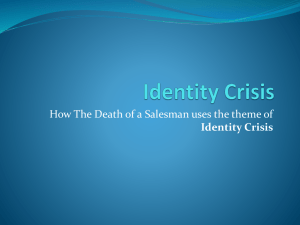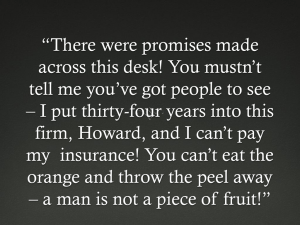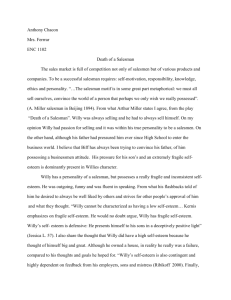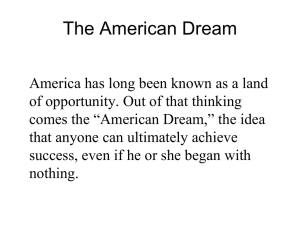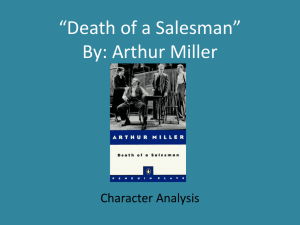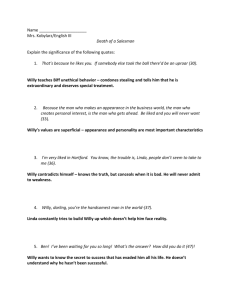Willie Loman and his Mistaken View of the American Dream
advertisement
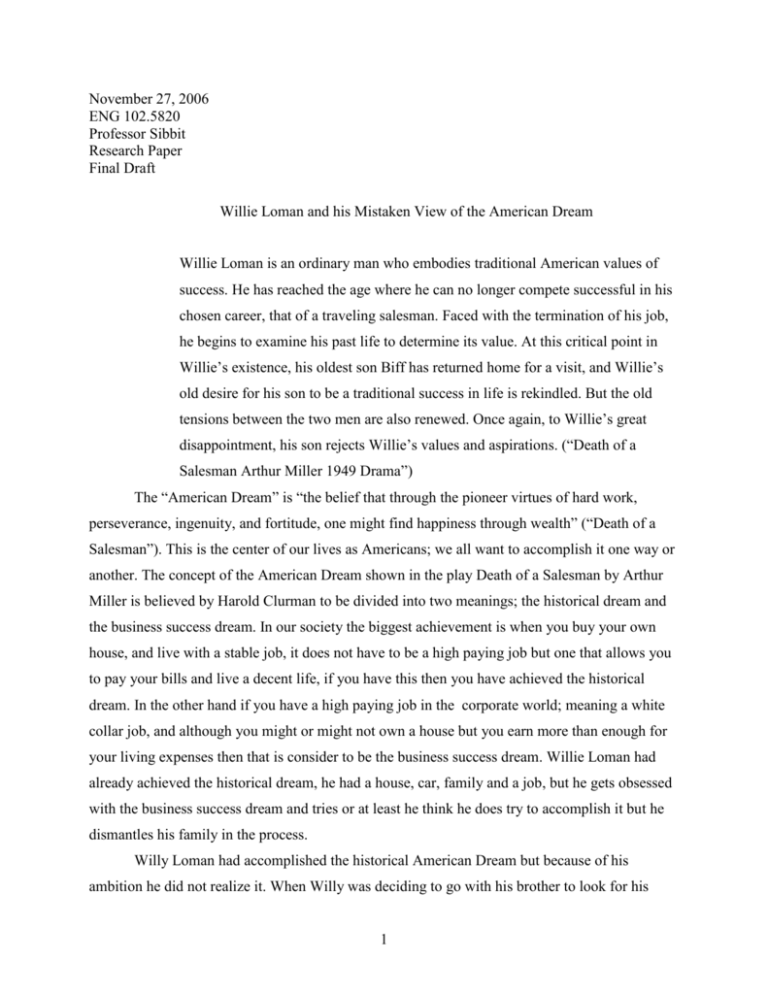
November 27, 2006 ENG 102.5820 Professor Sibbit Research Paper Final Draft Willie Loman and his Mistaken View of the American Dream Willie Loman is an ordinary man who embodies traditional American values of success. He has reached the age where he can no longer compete successful in his chosen career, that of a traveling salesman. Faced with the termination of his job, he begins to examine his past life to determine its value. At this critical point in Willie’s existence, his oldest son Biff has returned home for a visit, and Willie’s old desire for his son to be a traditional success in life is rekindled. But the old tensions between the two men are also renewed. Once again, to Willie’s great disappointment, his son rejects Willie’s values and aspirations. (“Death of a Salesman Arthur Miller 1949 Drama”) The “American Dream” is “the belief that through the pioneer virtues of hard work, perseverance, ingenuity, and fortitude, one might find happiness through wealth” (“Death of a Salesman”). This is the center of our lives as Americans; we all want to accomplish it one way or another. The concept of the American Dream shown in the play Death of a Salesman by Arthur Miller is believed by Harold Clurman to be divided into two meanings; the historical dream and the business success dream. In our society the biggest achievement is when you buy your own house, and live with a stable job, it does not have to be a high paying job but one that allows you to pay your bills and live a decent life, if you have this then you have achieved the historical dream. In the other hand if you have a high paying job in the corporate world; meaning a white collar job, and although you might or might not own a house but you earn more than enough for your living expenses then that is consider to be the business success dream. Willie Loman had already achieved the historical dream, he had a house, car, family and a job, but he gets obsessed with the business success dream and tries or at least he think he does try to accomplish it but he dismantles his family in the process. Willy Loman had accomplished the historical American Dream but because of his ambition he did not realize it. When Willy was deciding to go with his brother to look for his 1 father he met Dave Singleman. Dave was an ¨eighty four year old salesman who had drummed merchandise in thirty-one states and who could now simply go into his hotel room, call the buyers, and make his living in his green velvet slippers¨ (Stanton 131).This view of a tranquil and successful career made him reconsider his decision and instead of going to Alaska he chose to be a salesman. It seems that Willy saw a “father figure” in Dave, so he followed the same path, hoping he would have the same future and the same success in the field (Stanton 133). After thirty five years of his career he saw he hasn’t accomplished the success that he wanted. He devoted his life into a career as a salesman knowing that he was good with his hands, but ¨he possessed too much snobbery to admit that his own destiny was in a simple career as a carpenter¨ (“Death of a Salesman”). For Willy the difference between a white collar job and a blue collar job meant a lot, but he didn’t do much to gain a white collar one and he stayed with his old job. His career as a salesman did give him and his family the normal success people would want. Willy wanted more, and since he saw he didn’t accomplished it, he taught his kids into his way of seeing life, hoping they would have followed his path and accomplish the dream he had for himself. At the age of sixty Willy had built a family and had two sons. No matter what happened they will love and respect his dad to death. He was lucky enough to find a woman who devoted her life to adore him and treated him in a way nobody else would have. “She more than loves him, she admires him, as though his mercurial nature, his temper, his massive dreams and little cruelties, served her only as sharp reminders of the turbulent longings” (Miller 1195). She was the one that helped him throughout life and the one who helped him to reached the historical dream. Linda didn’t work but she was the one responsible for the house chores, as it was normal in a wife to do for the time in which the play took place, but she “seems very much planted in reality with her concerns over house payments, mending, insurance premiums, and her husband’s care”, Linda as a responsible wife does, distributed the money into the house payments, so they will be on time and all paid, so he won’t have to be worrying about the house responsibilities while he is on the road doing business (Murphy and Abbotson 6). His two sons adored him and idolized him while they were children, then they grew and saw the reality in which they had being raised into. Happy saws how Biff always got their dad whole attention, and Biff realized that his whole life has been a waste of time because he still did not find what he wanted to do, but no matter how much Biff and Willy will argue, they were pretty much alike. Biff loved his dad so 2 much, that when he came home and realized he disappointed his dad, he “resolves to reform his life for the sake of his father, and act 1 closes with the familiar denial of old wounds and Biff’s promise to make a business deal in New York” (“Death of a Salesman”). After realizing that he did not accomplish all the success that he wanted, or any success at all, he told his sons they needed to make a big business, but he told them to start big, instead of telling them to start from something little and then go big. And definitely the worst mistake that Willy had in raising his sons was to telling them that “sport success guarantees financial success” (Stanton 138). Willy believes that being well liked and having some money will solve life problems and, ultimately, result in happiness. Since Willy was never successful as a salesman, “he remains confident that his son Biff will be able to make it big in business because of his good looks and his past glory as a high school football star” what he didn’t realize was, that his own mistake was going to take his son into a different path because since the day Biff caught his father cheating on his mom in Boston, everything changed in his life (“Death of a Salesman”). He did not take the class he needed to graduate from high school and therefore did not go to college. Biff after realizing that his fathers dream was not his, he “recognize his own true nature, replacing his father’s dream with one of his own”, although it is not clear if he is going to be able to accomplish it, but at least is in some field that he really enjoys doing, and will be happy doing it for the rest of his life (Murphy and Abbotson 6). On the other hand since Willy teaches his sons about the wrong believes and ideas, Happy “does not reach the same level of awareness as his brother, and lives a shallow life which he pretends is a lot more glamorous than it really is”, this shows how his father influenced him in a bad way in his sons life. Willy always pretended to be more than what he really was (Murphy and Abbotson 6). Since Willy thought that money meant success, he always asked his sons how much were they making on their jobs. He kept asking his sons, about money and their jobs; telling them that they were suppose to be doing big in business, and that tormented them, and in result his sons lied to him all along, so when Biff started arguing with his dad in front of the whole family, he said to them that they “never told the truth for ten minutes in this house!”, but that was actually Willy’s fault, because they lied to pleased him (Miller 1261). It turned out that Happy was not the assistant buyer but one of the two assistants of the assistant, and that Biff does not like the corporate world but the life on the farms. After the confrontation with their dad Biff and Happy thought differently, they always have, but Biff actually realized that “success entails working at 3 an enjoyable job, which for him means working on a farm, outdoors, with his shirt off” while Happy “lacks the courage of honesty and remains caught in the rat race, still under the impression that wealth and status are the keys to fulfillment” (“Death of a Salesman”). Willy’s lack of understanding life and confusion about the real American Dream make him teach his sons wrong, and his failure is because he never really understood what was “really needed to succeed insisting to the end that ‘personality wins the day’” (Murphy and Abbotson 5). Willy’s false dream tormented the whole Loma family, since he started loosing his job, instead of looking for another one he stayed there, making his family believe that he was highly required in the company, but at the same time they had him working on commission. Howard Wagner, who was Willy boss, did to him what in business is known to be “lean and mean” which meant to move him to commission and then after a little period of time finally fired him (Murphy and Abbotson 199). Willy after seeing that at his age he had no way of being successful, he thought that the only way to accomplish the business American Dream was through committing suicide, which was a bad idea because the only thing he was going to cause will be sadness in his family. But he saw it from another point of view, which was from his ambition in the idea that success meant money, and that he wanted his sons specially Biff to accomplish his dream. He commits himself into several attempts for suicide. In the confrontation he had with Biff, he showed his dad the hose, so he’ll know that they are aware of his attempts of committing suicide, during the argument Biff tells his dad “What is this supposed to do, make a hero out of you? This supposed to make me sorry for you”, after this Willy should have realized that committing suicide wasn’t going to help him in raising his sons respect for him, but his thirst for the business success dream was much higher, so he didn’t pay attention to the advices given by his family. As Biff said, Willy thought that taking his own life will make a hero out of him, and Willy thought that “To save his life, he has to kill himself” because he hoped that his family especially Biff would get the insurance money (Heyen 51). “Willy commits himself to a pathetic death and meaningless legacy (even if Willy’s life insurance policy ends up paying off, Biff wants nothing to do with Willy’s ambition for him)” Willy didn’t realize that even though if his son gets the money, his dream is completely different than Willy’s. Willy wants a white collar job for his sons, while Biff will be happy with a job at a farm, working outdoors, so Biff wouldn’t care if he gets his dads money or not (Heyen 49). Nobody understood his decision but him, not even his wife. Linda thought of it as no necessity because “for the first time in thirty five years 4 we were just about free and clear” meaning even the house payments were all done, now that they completely own their house, there’ll be nobody to occupy it. But in the other hand for Willy “Admission of failure would have led to suicide the same way as his enduring dream to led to suicide”, so in his point of view the two choices that he had leading him to the same result (Heyen 49). But on the others point of view, he acted like a coward, taking his own life just to get some money to his family. Although in the play it doesn’t say whether or not the Loman family got the insurance money, it does clarify the confusion about the American Dream that Willy had, and in consequence the influence that it had on his sons. But what we have to remember is that Willy has been thirty five years in the selling business. He is definitely a professional in what he does, so “He is a salesman! He’s trying to sell us the wrong dreams!” but he was only one who bought (Heyen 51). The bad part of this is that because of his obsession with the business success dream he destroyed and dismantles his family in the process. 5 Works Cited “Analysis of Major Characters.” Spark Notes. 14 Nov 2006. <http://www.sparknotes.com>. Bigsby, Christopher. “The Poet.” Humanities 22:2 (Apr. 2001): 10-17. Academic Search Premier Ebscohost. City U of New York Lib. 14 Nov. 2006 http://web.ebscohost.com>. “Death of a Salesman.” Magill Book Reviews. (01 Jan. 1990). Academic Search Premier Ebscohost. City U of New York Lib. 11 Nov. 2006 <http://web.ebscohost.com>. Heyen, William. “Arthur Miller’s Death of a Salesman and the American Dream.” Arthur Miller’s Death of a Salesman. Ed. Harold Bloom. New York: Chelsea House, 1988. 47-58. Johansson, David. “Death of a Salesman.” Juvenile and Young Adult Literature Series.(Feb. 2005). Magill On Literature Plus Ebscohost. City U of New York Lib. 14 Nov. 2006 <http://web.ebscohost.com>. Miller, Arthur. “Death of a Salesman.” Literature: An Introduction to Fiction, Poetry and Drama. 4th compact ed. Ed. X.J. Kennedy and Dana Gioia. New York: Longman, 2005. 1194-1266. Murphy, Brenda and Susan C.W. Abbotson. “Death of a Salesman’s Impact on American Culture.” Understanding Death of a Salesman. Ed. Claudia Durst Jhonson. Westport CT.: Greenwood Press, 1999. 197-201. Murphy, Brenda and Susan C.W. Abbotson. “The Significance of Death of a Salesman’s” Understanding Death of a Salesman. Ed. Claudia Durst Jhonson. Westport CT.: Greenwood Press, 1999. 4-7. Stanton, Kay. “Women and the American Dream of Death of a Salesman.” Willy Loman. Ed. Harold Bloom. USA: Chelsea, 1991. 129-153. 6
